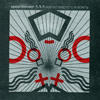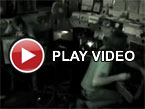Spoonbender 1.1.1, "Stereo Telepathy Academy"
 I Am Spoonbender is one of a handful of groups in serious danger offalling through the cracks merely because they were unfairly andinaccurately lumped in with the glut of trendy Electroclash groups thatfound brief, faddish popularity in the early 2000s. After the wreckagecleared and everyone came to their senses, it seemed that IAS and a fewother bands only tenuously connected to this scene were effectivelydisposed of in certain critical circles, like the proverbial baby with the bathwater, despite thefact that they significantly preceded the trend and differdrastically in their musical approach and content.
I Am Spoonbender is one of a handful of groups in serious danger offalling through the cracks merely because they were unfairly andinaccurately lumped in with the glut of trendy Electroclash groups thatfound brief, faddish popularity in the early 2000s. After the wreckagecleared and everyone came to their senses, it seemed that IAS and a fewother bands only tenuously connected to this scene were effectivelydisposed of in certain critical circles, like the proverbial baby with the bathwater, despite thefact that they significantly preceded the trend and differdrastically in their musical approach and content.The Helen Scarsdale Agency
I Am Spoonbender were clearly much more than just another in a legionof vapid fashion clones making derivative, pseudo-nostalgic garbagetarted up with bitchy posturing, but perhaps because of their usage ofsynthesizers, drum machines and their tantalizingly retroactivereferentiality, they were nonetheless linked to Electroclash, much totheir detriment. A few like Ladytron and Adult have managed tosurvive the post-clash diaspora with a modicum artistic integrity intact,which means that there is hope for IAS as well, especially since theSan Francisco band have always had a lot more going on in the ideadepartment than either of the aforementioned two groups.
Their live shows are spectactular multimedia affairs combiningseizure-inducing light shows with sophisticated rear projections andmusic that comes on like the bastard child of Klaus Schulze and Devo,live drums and banks of Numan-esque synths churning out pulsating,mindbendingfrequencies of sound with subtle aesthetic/political programmingseeping in like subliminal propaganda. Their recordings reveallayers of intelligence and complexity with repeated listens. Inshort, IAS are far too smart and thoughtful to be stuck in the samehole with all the other pidgeons. In fact, if I Am Spoonbendercould be said to belong to any particular milieu, I would place themwithin thesmall and perhaps heterogeneous collection of wildly creative SanFrancisco audiovisual artists that also includes Matmos,irr.app.(ext.),and Sagan.
All this sets the stage for Spoonbender 1.1.1, described as the"tele-ambient dream self" of I Am Spoonbender. Where IAS is theplatform for the groups more populist, outwardly directed energies,Spoonbender 1.1.1 seems intended as a willfully esoteric, theoreticalcounterpart. The music is more abstract and freeform than IASproper, longform ambient compositions synchronized with specially chosen visualelements. In the case of Stereo Telepathy Academy, the visual element is director David Cronenberg's rarely-seen early short film Crimes of the Future,a twisted, disturbing bit of Ballardian mindfuck that put the directoron the map as a truly original voice in modern film. Though the album soundtracks an edited-down version of Crimes, it includes all of the voice-over narration from Cronenberg's other early experimental film Stereo, afilm that purports to be the actual video record of a scientific studyconducted for the purpose of exploring experimentalsurgical procedures meant to advance telepathic communication. Throughout the film's silent succession of vignettes, a cold, monotonevoice frequently breaks in to describe the purpose of the study and thefindings, callous and clinical descriptions that are often belied bythe disturbingly emotional and sexual imagery on display. Spoonbender 1.1.1 retain this voice-over narration along withtheir ambient synthesizer excursions, so that the CD might serve asa sort of Pink Floyd/Wizard of Oz hybrid alternate soundtrack to Cronenberg's Crimes, which is thematically linked to Stereo in ways that might not seem obvious were it not for this unorthodox juxtaposition.
Appropriate to the soundtracking of a film that plays on that strainof experimental, transgressive literarature typified by Burroughs andBallard (whose landmark experimental novel Atrocity Exhibitionisconsciously evoked in Cronenberg's films),Spoonbender's technique hereis a variant of the Burroughs/Gysin "thirdmind" technique. Combining two film sources that were never meantto be combined, then bridging the ideological gap with their richlyevocative music, the music preserves the elements of chance andsynchronicity. This effect comesacross splendidly when actually using the CD as a sountrack to theCronenberg film (which is only available as an included extra on theDVD of Cronenberg aberrant racing car b-movie Fast Company, strangely enough), full of zeniths and nadirs that often seem to correspond with the film's strange rhythms.
The music itself, taken on its own terms, is spacious and hypnotic,a gorgeous inner/outer spacescape to rival the most galactic ofkrautrocks, with deliciously ear-massaging sprays of self-reproducinganalog spores. Along with the surreal, detached recountingspseudo-scientific concepts like "psychic dominance" and "sociallyisolated telepathic gestalt" provided by the Stereo narration, Spoonbender 1.1.1 create agloriously suggestive blanket of shape-shifting psychedelic drones,quivering energy fissures and ghostly evocations of hopelessly obscuredtransmissions. I enjoyed it in much the same way I enjoyed DeliaGonzalez and Gavin Russom's Days of Mars and Dopplereffekt's Linear Accelerator,but somehow to my ears Spoonbender 1.1.1 has it even more on theball. Their particular mutant method of birthing spaceborne ambient electronicsis more crystalline in its purity, more specific in its intent, andultimately more powerful in its effect. It is clear that IAS areready to emerge from under the long shadow cast by the unfortunatecritical assocations of their past. No one is going to mistakethis for the new Fischerspooner album.
samples:



